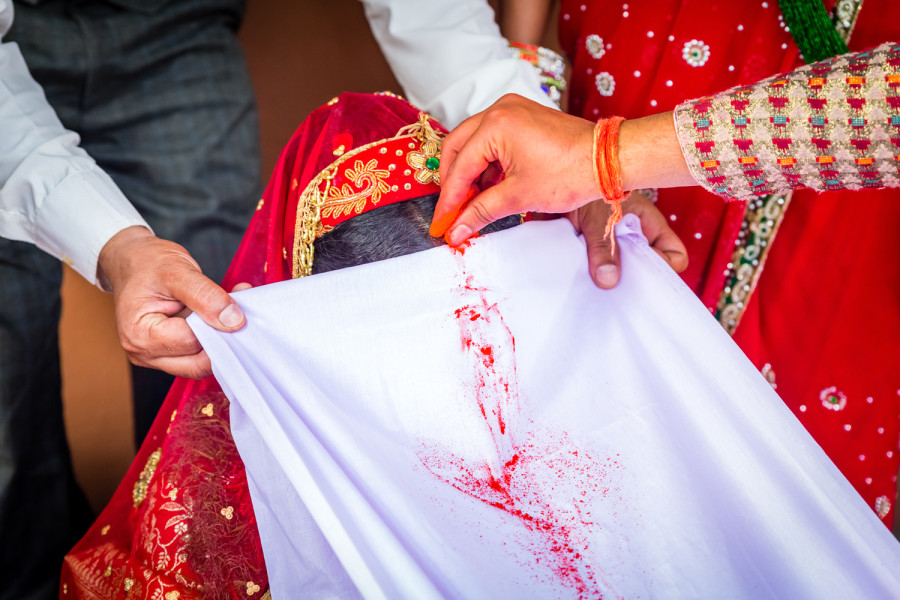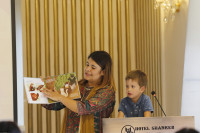Weekender
Wedding in the time of pandemic
Whether you’re Zoom-ing in from home or zooming out to attend one in person, the standard rules of COVID-19 prevention are still very important during this wedding season.
Pooja Lakhey
In a normal year, lots of Nepalis would’ve been getting ready to attend weddings almost every other week—shopping for new sarees, ordering gifts for the couples, rehearsing dance steps with cousins. But as we all well know by now, 2020 is no normal year. The global pandemic and the social-distancing policies that have been put in place to curb the spread of COVID-19 have effectively ruled out large gatherings and made many people much more hesitant to go far from home.
In recent weeks, couples all around the world have taken to social media to detail the latest news on their upcoming weddings. Even royal weddings were affected. Princess Beatrice and her fiancé Edoardo Mapelli Mozzi announced that they have cancelled their Buckingham Palace wedding reception, which was scheduled to take place in May.
Weddings have been dramatically downsized, postponed, or cancelled. The gauzy, fluttery lehenga you bought back in February to wear to a friend’s now-postponed May wedding hangs solemnly in your wardrobe, a delicate question mark suspended in the air. The virtually non-existent wedding season of 2020 promises to be strange. And there’s a strong possibility that this weirdness will last, that weddings as we know them—grand, festive events, with extended family and friends in attendance—won’t be the norm again for a long time.
Anju Shrestha in Kathmandu was supposed to get married in April—but in March, the government directed residents to self-quarantine. Anju and her fiancée initially rescheduled their wedding for August, but then the hotel venue announced it was closing for the remainder of the year.
“With only 17 wedding dates this Nepali year (2077 BS), we had been planning our wedding since last October,” says Anju, who married her high school sweetheart this past Sunday. “This was supposed to be the most exciting time—instead, it was all stress for weeks.”
Naturally, though, the idea of a smaller, more low-key wedding started to look more and more appealing to the pair, and that is what they exactly did. “When the lockdown kept on being extended, we had given up hopes of getting married this year. But with eased lockdown, we went ahead with a small ceremony at home with about 50 people.” The couple still plans to have a bigger celebration later on, after it is completely safe and restrictions have lifted.
When the coronavirus first hit, a lot of couples initially pushed their ceremonies to later this year. But the pandemic has become a more prolonged ordeal than many of those couples expected at first—so some are turning to what a wedding website The Knot have dubbed “mini-monies,” for miniature ceremonies. Small enough to comply with size limits on gatherings and also to responsibly practice social distancing, these are pared-down, minimalist events with just their family.
Ipsa Tuladhar from Nepal Wedding Planners informs that a few of their clients whose weddings were planned for this summer have chucked their original plans for a big event and gone the mini-mony route. This is especially true of those who want to get married on the sooner side so they can start a family. But more common, as Ipsa says, are the clients who are, perhaps optimistically, rescheduling their weddings for later this year. “Most weddings that were supposed to take place in the months of Baisakh, Jestha, and Asar have been moved to winter as the clients want to stick to the plan of a big wedding and do it when it is safe to do so,” she adds.
So, what if your relatives or friends are going ahead and having the wedding and you’re obliged to be there? Details matter when it comes to making the decision to go (or not go) to a wedding, says Dr Prathit Kulkarni, an assistant professor of medicine-infectious diseases at the Baylor College of Medicine in Texas.
Are you planning to go to a wedding where everyone but the bride and groom is spaced at least six feet apart during the wedding itself and the reception? That’s safer than a traditional wedding, where everyone is packed together for the ceremony and reception, he adds.
“A large event with plenty of people, at this point, based on the current transmission dynamics, it’s not recommended,” Kulkarni says. Having a wedding and reception indoors is also tricky because people are closer together and there’s more shared air. Still, the decision is ultimately yours. “It’s all risk tolerance,” he says. “It’s more of a case-by-case assessment situation rather than an absolute yes or no.”
If you decide to go to a wedding and want to be as safe as possible, the standard rules of COVID-19 prevention are still important. That means maintaining social distance, wearing a mask, and regularly washing your hands well with soap and water. “You should still be following all the guidelines, and they still apply, even though it’s a wedding,” Kulkarni says. So, try to avoid giving hugs and kisses, and do your best to stay at least six feet away from people you talk to.
Of course, you might find yourself in some situations that aren’t explicitly spelt out by the guidelines. So, keep these pointers in mind to help keep you from having to scramble at the moment:
Try to avoid using the bathroom when other people are in there. People tend to be pretty close together when they’re in a public bathroom, and that’s a prime opportunity for the virus to spread. If you can, wait until other people leave before you go in and don’t linger after you’ve used the bathroom.
Sit with your immediate household or inner circle. Whether it’s at the ceremony or the reception, try to surround yourself with the people you actually live with. Keep in mind that six feet applies to people to the side, front, and back of you.
Steer clear of popular spaces. If there’s a buffet line, you don’t want to be jammed into the queue with everyone else. So, if your stomach can take it, try to wait until everyone has gotten their food and there are only stragglers at the buffet to get your meal. Ditto for the bar and first dance crowd.
In all sense though, telling someone you’ve decided not to go to their wedding over COVID-19 fears pretty much conveys to them that you don’t agree with their way of handling the virus—and that’s a hot button topic right now. Plus, you’re voluntarily making the decision not to be there for their special day, when they so clearly want you there. You can ask if there is any way to Zoom into their wedding so you can at least be virtually there. You can also write them a special poem (if that’s your thing), craft a meaningful message for the wedding day, or send a gift to let them know you’re thinking of them.




 22.12°C Kathmandu
22.12°C Kathmandu










